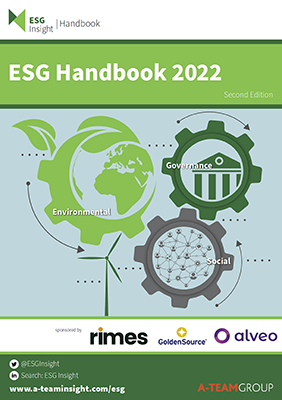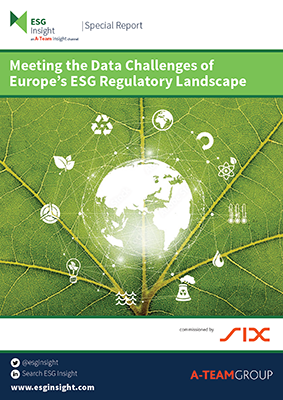RegTech Insight ESG The latest content from across the platform
A-Team ESG Data and Tech Summit Debuts with a Message of Care
“He who cares wins.” If the many takeaways from A-Team Group’s inaugural ESG Data and Tech Summit in London last week could be summarised in one quote, it is that from Sean Taylor, Executive Director, Canaccord Genuity Wealth Management. The former military serviceman paraphrased the slogan of the UK’s elite army corps, the SAS, to characterise…
ESG Data and Tech Summit: Planet and Profit Depend on Getting ESG Data Right
Getting ESG data right is vital not only for financial institutions’ bottom lines and to meet regulatory obligations but for the very survival of the planet. The hard-hitting observation was made by Phillip Miller, Co-Founder and Co-Chief Executive at software manager Solidatus in a keynote address to the inaugural A-Team Group ESG Insight Data and…
RepRisk: SFDR Must Go Beyond Disclosures to Capture Full Impact
European ESG legislation is failing to capture and mitigate the true impact of corporate activities on the environment and society, a leading data provider has said, calling for regulators to go beyond relying on company disclosures. Zurich-based RepRisk has argued that the European Union’s Sustainable Finance Disclosure Regulation (SFDR) needs to focus on impact, to…
ISS ESG Launches Customisable Tool to Meet Regulatory Requirements
ISS ESG has created a data-rich solution to help fund manufacturers and other asset managers create and manage portfolios that fit their sustainability strategies and comply with evolving global regulations. The Regulatory Sustainable Investment Solution (RSI) enables market participants to establish the proportion of their investments that adhere to customisable sustainability thresholds. The product if…
ESG Data Handbook 2022
The ESG landscape is changing faster than anyone could have imagined even five years ago. With tens of trillions of dollars expected to have been committed to sustainable assets by the end of the decade, it’s never been more important for financial institutions of all sizes to stay abreast of changes in the ESG data…
Inaugural ESG Data Summit to Take Deep Dive into Sustainability Goals and Challenges
The pressure for financial companies to get their ESG data capabilities in order is mounting from clients and regulators as private capital takes centre stage in the fight against climate change and social division. These issues and many more will be discussed by leading data vendors and managers as well as financial institutions when they…
Meeting the Data Challenges of Europe’s ESG Regulatory Landscape
The European Union’s ESG reporting regulations continue to evolve and represent the biggest recognition yet by any international authority of the role that financial institutions will play in the climate transition. The Sustainable Finance Disclosure Regulation (SFDR), the EU Taxonomy, the Non-Financial Reporting Directive (NFRD) and the Corporate Sustainability Reporting Directive (CSDR) are intended to…
SBTi Warns Lack of Net-Zero Standards Will See Paris Goals Missed
The absence of standard global reporting structures has long been seen as an impediment to the effective allocation of resources into ESG-themed projects and products by financial institutions. Now they are finding similar handicaps as they try to navigate the net-zero transition space, according to a report by leading greenhouse gas reduction framework setter Science-Based…
Social Taxonomy Poses Data Challenges Say Experts
The European Union’s plans to create a Social Taxonomy will pose even greater data challenges than the framework created for financial institutions and companies to report on their environmental impacts. Experts warn that the lack of concrete data on issues such as diversity and modern slavery will make the process of formulating the regulation slow…
Data Firms See Benefits From ISSB, GRI Coordination
Data vendors and managers have welcomed a recent tie-up between two major global ESG standards setters, saying the move would bring clarity to the opaque sustainability reporting space. Leading companies in the ESG data space said the memorandum of understanding signed between the International Sustainability Standards Board (ISSB) and Global Reporting Initiative (GRI) would lead…











